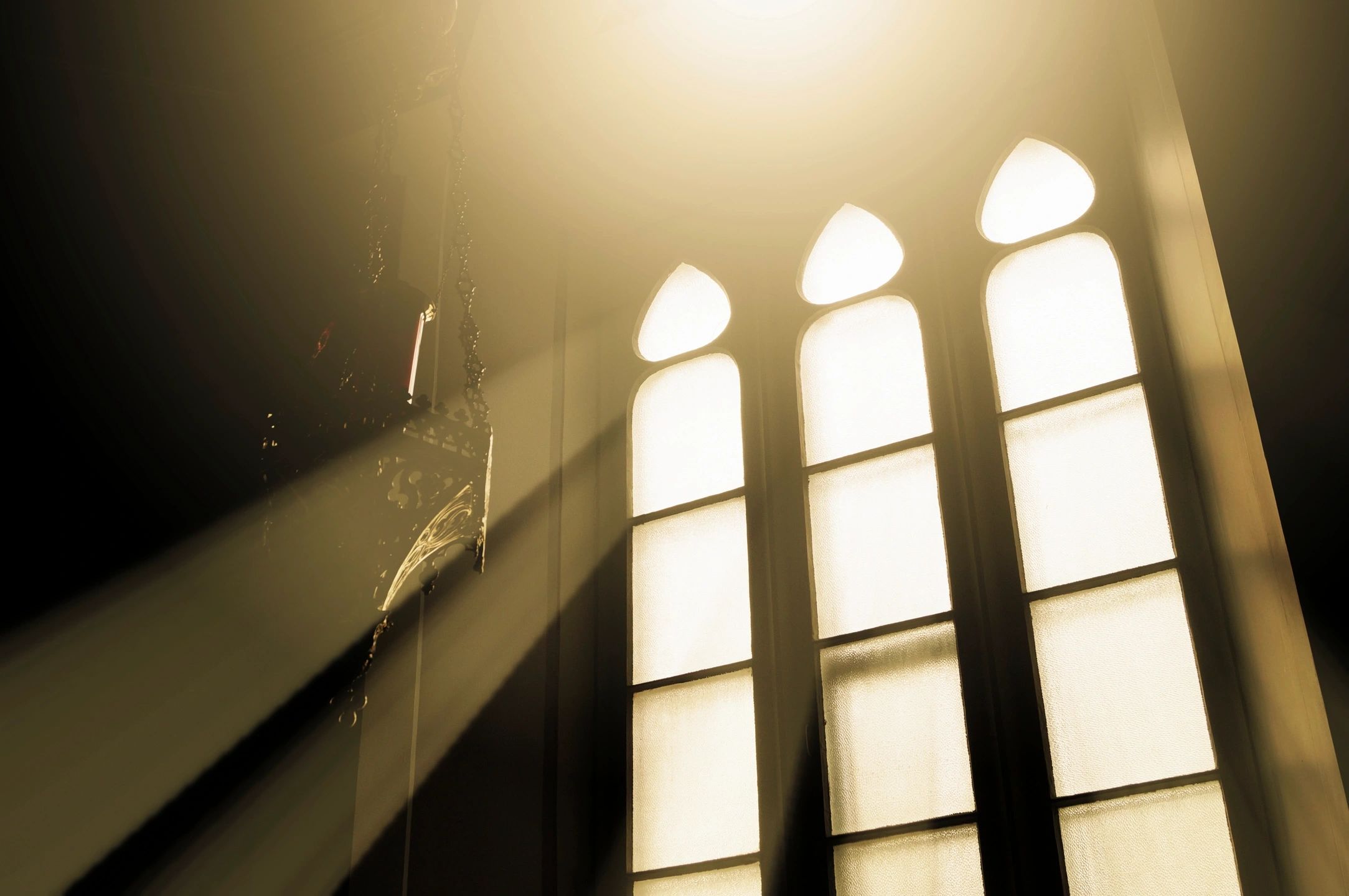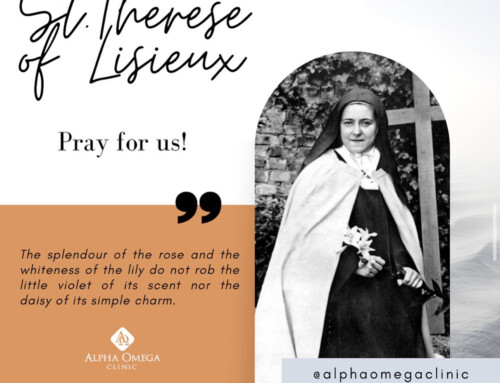Alpha Omega Clinic is a mental health clinic that specializes in offering services that are fully integrated with the Catholic faith. As such, we believe it is important to explore what this means and share our perspective. This perspective has been shaped and informed by the last twenty years of service to the DMV. Our aim is to bring clarity to this unique model of mental health treatment and advocate for the importance of our approach. We believe this type of transparency can also ease the transition into therapy and maximize the benefits of those already in therapy.
At the outset, it should be noted that our perspective is not exhaustive nor the only way to define Catholic psychotherapy. We are committed to expanding the “leading edge” of Catholic psychotherapy and will continue to evolve as we learn more about what is most relevant to our clients. This process hinges on the work being done in the therapy room. Our capacity and understanding grows as we gather more data from our time sitting with others. We are indebted to our clients, past and present, for helping us understand what it really means to be Catholic therapists.
What Catholic Psychotherapy is Not
Taking a cue from apophatic theology, we can understand a lot about Catholic psychotherapy by ruling out what it is not. Catholic psychotherapy is not pastoral counseling. While this distinction may seem trivial, it is actually very important. Pastoral counseling is a form of psychotherapy that is typically reserved for clergy. It involves the use of spiritual resources, informed by psychology, for healing and growth. Pastoral counselors have training in mental health, spirituality/religion, and/or theology. As the name indicates, this type of counseling is pastoral in nature. As such, the primary method of treatment relies on direct advice and/or counsel to the client based on tenants of the faith being represented by the counselor. While this advice or counsel is informed by psychological understanding, it is often a “faith first” type of approach if you will. The goal is to help the client grow in a way that advances the person in the spiritual life.
Catholic psychotherapy may share some things in common with pastoral counseling but is fundamentally different in nature. For instance, we may utilize Scripture, the lives of the saints, Church teaching, or other aspects of our faith to support and encourage clients but we do not claim to be theologians or spiritual directors. Our focus is on guiding growth and healing from a human perspective that is informed by our faith. This means that the way we conduct treatment will be in harmony with the teachings of the Catholic faith but not necessarily using the tenants of the faith directly. We certainly believe in the spiritual treasures that our Catholic faith has to offer and encourage our clients to utilize spiritual resources that are most relevant, but this will not be our primary way of helping clients.
We also defer to our clients when considering how much they would like to bring their faith directly into the therapy room. Our approach is client-driven and client-focused when it comes to discussing faith matters; we can talk about it as little or as much as the client prefers. At times, this might include consulting with priests or spiritual directors (with the client’s consent of course). This allows us to work on the human side of healing and hand over the spiritual side of things to God. In the words of Gladys Sweeney, “We’re like John the Baptist, we get things out of the way. It’s like we’re making straight the path by removing human boulders and then let God take over”.
Additionally, we do not give direct advice or counsel to our clients. Our primary focus is on supporting our clients to help themselves grow and heal. We have a tremendous amount of respect for our clients’ autonomy, internal resources, and decision-making capacity. Our interventions are aimed at coming alongside our clients to help them help themselves. This is done by employing the most empirically studied and evidenced-based models of psychotherapy available to us. The field of psychotherapy has a long history of research and scientifically studied outcomes. Recent advancements in the field of neuroscience have confirmed many of the fundamental beliefs contained within the most studied models of treatment. As we sharpen our understanding, we continue to implement more and more precise interventions to better help those entrusted to our care.
What is Catholic Psychotherapy?
We’ve covered some of the practical distinctions that separate Catholic psychotherapy from pastoral counseling, but I’d like to lean into the heart of what it means to be a Catholic therapist. First and foremost, being a Catholic therapist is a vocation. The call to sit with others in their suffering is no easy task and there are special graces granted by God to those of us who answer this call. As humans, our hearts ache for our clients and what they have endured. As clinicians, we are emboldened to courageously face this suffering with our clients and find a way through that leads to flourishing. I am reminded of Pope Saint John Paul II’s words in Salvifici Doloris:
“Following the parable of the Gospel [The Good Samaritan], we could say that suffering, which is present under so many different forms in our human world, is also present in order to unleash love in the human person, that unselfish gift of one’s “I” on behalf of other people, especially those who suffer. The world of human suffering unceasingly calls for, so to speak, another world: the world of human love; and in a certain sense man owes to suffering that unselfish love which stirs in his heart and actions…It is not without reason that, also in ordinary speech, any activity on behalf of the suffering and needy is called “Good Samaritan” work. In the course of the centuries, this activity assumes organized institutional forms and constitutes a field of work in the respective professions. How much there is of “the Good Samaritan” in the profession of the doctor, or the nurse, or others similar! Considering its “evangelical” content, we are inclined to think here of a vocation rather than simply a profession.”
The Catholic therapist is then called to become a vessel for the love of Christ. Regardless of what they may be struggling with, each client bears the image of God; Christ is hidden within them. We may respond to this call on the content level by reassuring our clients that they are deeply loved by God, but we aim to primarily express this on the process level. In other words, how we relate to our clients should reflect the call to love our neighbors and enter in to their suffering with them. How we treat our clients and the way we conduct therapy should be Christ-like. The dynamic should be a reminder that the therapist is never “above” the client as a “judge” but rather as a co-pilgrim in a reciprocal relationship. We see the depth of another and respond with compassion, charity, and clinical aid. This calling is echoed in Pope Francis’s exhortation Gaudete et Exsultate:
“I can respond with faith and charity, and see in this person a human being with a dignity identical to my own, a creature infinitely loved by the Father, an image of God, a brother or sister redeemed by Jesus Christ. That is what it is to be a Christian! Can holiness somehow be understood apart from this lively recognition of the dignity of each human being? … Jesus is already there, in the hearts of our brothers and sisters, in their wounded flesh, in their troubles and in their profound desolation. He is already there.”
This way of interacting with our clients is rooted in the central tenant of our faith: God loves us so much that He sent His Son to die for us so that we may be free from sin and death. As we work out what this looks like in each of our lives, we inevitably encounter obstacles. These obstacles are often the source of our suffering. As we grapple with and overcome these obstacles, we become more fully alive and more fully human. This is emphasized in Gaudete et Exsultate: “The important thing is that each believer discern his or her own path, that they bring out the very best of themselves, the most personal gifts that God has placed in their hearts…We are all called to be holy by living our lives with love and by bearing witness in everything we do, wherever we find ourselves”.
Presuming that we understand or can make meaning of our clients’ suffering is something that we cannot do. But, we will accompany them through it with the best of our clinical knowledge and skill. We hope to help relieve these great burdens as a way of supporting their growth (emotionally, psychologically, relationally, and spiritually). To help others remove these obstacles is a heavy responsibility but we rest in the knowledge that God is with us every step of the way. That is not to say that mental health struggles are necessarily part of our path to holiness. I have found that the most powerful and transformative experience is to sit with another as they bear the weight of an incomprehensible evil that cannot be explained as anything other just that: an evil in a fallen world. Sometimes the only good to be found in these places is the courage to sit in it together.
Our primary role as Catholic therapists is to bring the love of Christ to our clients by meeting them where they are with compassion, empathy, and the best of our clinical toolbox. We join them in the process of alleviating suffering and accompany them on the journey towards healing so that they may access the fullness of their humanity. Human flourishing is a mighty sign of God’s glory. We are blessed to have some small role to play but ultimately we hope to fade into the background and humbly thank God for this opportunity.
Warmly,
Jonathan Dixon, LMFT
Jonathan Dixon is a Licensed Marriage and Family Therapist in Virginia who has offered mental health services at Alpha Omega Clinic’s Fairfax office since 2013. He is an active member of the Association of Marriage & Family Therapy.





